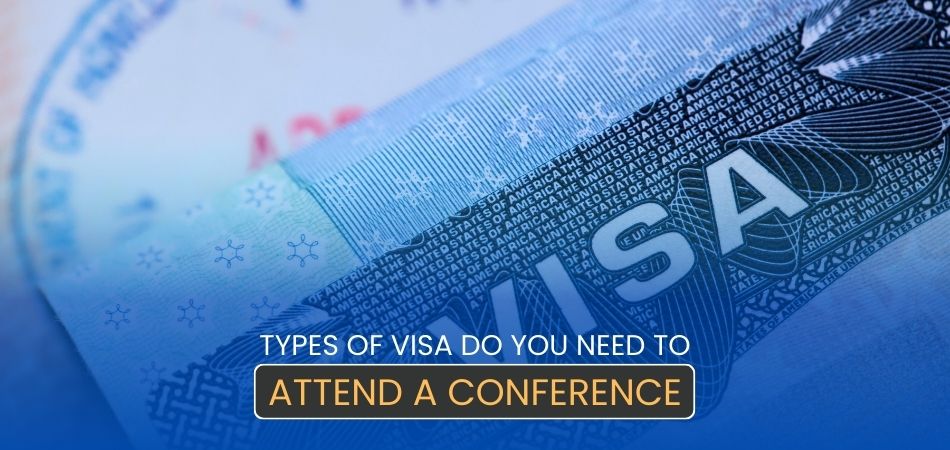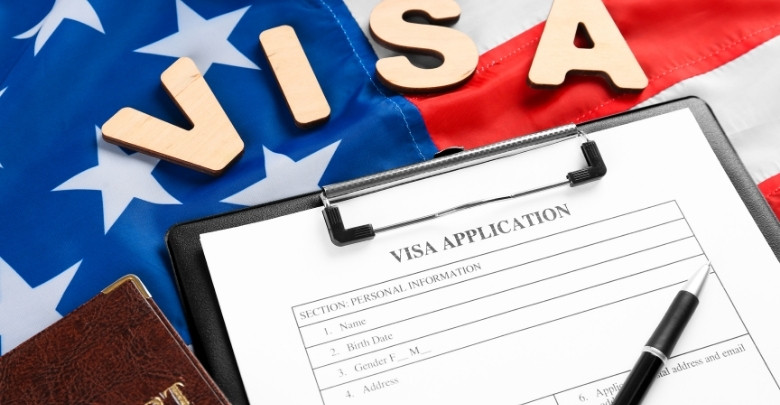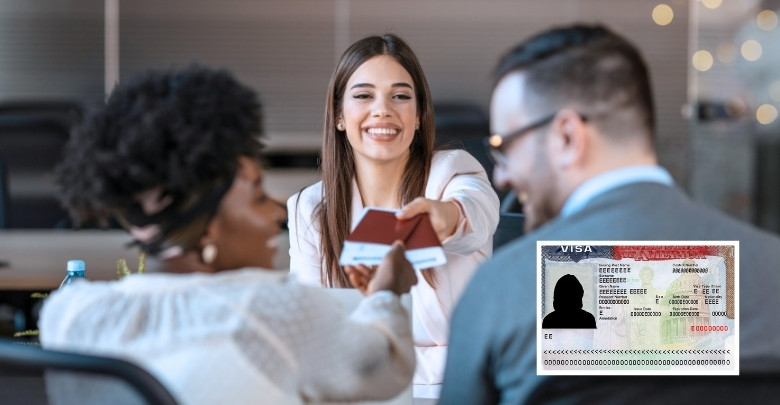Washington, DC hosts multiple conferences each year, attracting professionals from around the globe. To attend a conference in Washington, DC from another region, you must be familiar with the visa requirements. Now the question is, what types of visa do you need to attend a conference in Washington DC?
Generally, you will require a B-1 Business Visitor Visa to attend a conference in Washington DC. If your trip includes both business and leisure, the B-2 Tourist Visa might also be applicable. Travelers from Visa Waiver Program countries can use ESTA for easier entry. In some cases, such as for specialized fields, a J-1 Exchange Visitor Visa could be necessary.
This article will help you understand the specific requirements associated with your conference visit as well as how to ensure a smooth visa processing process. So Stay with us.
What Types of Visa Do You Need to Attend a Conference in Washington DC? Find Out Now!
Being involved in a conference in Washington DC would be an exciting and enjoyable experience. But before you book your flight, you need to understand the visa requirements. Choosing the right visa might seem confusing, but it’s easier than you think. Here are some options that will assist you in getting started:
B-1 Business Visitor Visa
If you’re traveling to Washington DC specifically for a business conference, the B-1 Business Visitor Visa is your best option. This visa allows individuals to attend meetings, conventions, and other professional events. It is valid for short stays, usually up to six months. The process involves submitting documents that show the purpose of your trip and proof of your return to your home country.
The B-1 visa is a non-immigrant visa, meaning you must prove you do not intend to stay in the U.S. long-term. You will also need to demonstrate that you have enough financial resources to cover your trip. This visa is usually easier to obtain if your trip is solely for business purposes. However, a clear itinerary and strong ties to your home country are essential for approval.
B-2 Tourist Visa
In some cases, the B-2 Tourist Visa may be applicable. Travelers often consider using a tourist visa for conferences in Washington DC when they want to enjoy sightseeing too. This visa allows you to attend a conference while also enjoying tourism in the U.S. It is a common option for travelers who wish to combine professional and personal activities during their visit.
Like the B-1 visa, the B-2 is a non-immigrant visa. However, you may need to show a balance between business and tourism in your travel plans. The visa allows you to participate in conferences, but its primary purpose must be for leisure or tourism. Immigration officers will carefully assess the nature of your visit upon arrival in the U.S.
Visa Waiver Program (ESTA)
Travelers from countries participating in the Visa Waiver Program (VWP) may be eligible to enter the U.S. without a visa. Through the Electronic System for Travel Authorization (ESTA), you can attend a conference in Washington DC for up to 90 days. ESTA is available to citizens of select countries, making it a more convenient option for eligible travelers. However, you must still meet the basic entry requirements for the U.S.
ESTA allows for business and tourism purposes, but it is not intended for long stays or multiple business activities. It’s important to ensure that your trip aligns with ESTA regulations to avoid complications. Even though ESTA is easier to obtain, it still requires approval from U.S. authorities. Always check your eligibility before applying, as certain conditions apply.
J-1 Exchange Visitor Visa
For specialized fields, the J-1 Exchange Visitor Visa might be required to attend a conference. This visa is generally intended for individuals participating in exchange programs, including conferences, training, and research. It is ideal for professionals who are invited to the U.S. to share their expertise in a specific field. You must have an approved sponsor to apply for this visa type.
The J-1 visa typically involves a more detailed application process, including the submission of sponsorship documents. This visa may come with specific program requirements that you must meet. Depending on your field, a J-1 visa might be the best option for attending a highly specialized conference. Be prepared to provide evidence of your participation in the exchange program and other supporting documentation.
Getting Ready to Apply
Preparing for your visa application starts with knowing which category best fits your travel purpose. Whether it’s B-1, B-2, ESTA, or J-1, accuracy is key. Double-check the eligibility, timeline, and documentation needed for your chosen visa. A clear understanding helps avoid delays and unnecessary complications during the application process.
Gather all required documents before starting your application to ensure a smoother experience. These typically include an invitation letter, passport, proof of funds, and itinerary. Some visa types may ask for additional forms or sponsor details. Being organized from the beginning increases your chances of approval and saves time.
Most Effective Ways to Apply for a Visa to Attend Conferences in Washington, DC
Applying for a visa to attend a conference in Washington, DC is an important step to ensure you can travel smoothly. Being aware of the process can make things less stressful. Let’s go over the best ways to apply and what to avoid:
Check Visa Requirements
The first step is figuring out which visa you need. If you’re planning to attend events or conferences in Washington DC, you’ll likely need a B-1 Business Visitor Visa. Sometimes, a B-2 Tourist Visa works if you plan to mix business and sightseeing. Checking your situation carefully helps you choose the right option. Once you know your visa type, the rest becomes much easier.
Gather Important Documents
Having the right documents ready makes the application process smoother. Start with your passport, which should be valid for at least six months after your planned stay. You’ll also need an invitation letter from the conference organizers. Don’t forget proof of financial support, like bank statements. Double-checking your documents before applying saves time and stress.
Fill Out the Application
Completing the visa application online is a must. You’ll need to fill out Form DS-160 for most nonimmigrant visas. Make sure you answer all the questions honestly and carefully. Upload a recent photo that meets the U.S. visa photo requirements. Once done, print the confirmation page for your records.
Pay the Visa Fee
Paying the visa fee is a required step, and it’s non-refundable. You can usually pay online, but make sure to keep the receipt. The fee amount may vary depending on your country. Having proof of payment is important for your visa interview. Check your local embassy’s website for payment methods.
Schedule Your Interview
After paying the fee, you’ll need to book an interview at the U.S. embassy or consulate. Pick a date that works for you, but remember that some locations have long waiting times. Arrive at your interview with all necessary documents. Practice answering common questions, like why you’re visiting Washington, DC. Being prepared helps you feel more confident.
Prepare for the Interview
Your interview is an important part of the visa process. Dress neatly and be polite during your visit. Be clear about why you’re going to Washington, DC, and what the conference is about. Carry all your documents, including your passport and confirmation page. Answer questions honestly to make a good impression.
Follow Up on Your Visa
Once the interview is done, your application will be processed. You might get your visa right away or after a few weeks. Track your visa status online to see updates. If approved, check that all the details on the visa are correct. If there’s a delay, don’t panic—just follow up with the embassy.
Why Some Conferences May Require a J-1 Visa Instead of a B-1 Visa?
A B-1 visa is not always sufficient for attending a conference in the United States. Some conferences need you to have a J-1 visa instead. The type of event and what you plan to do there matter a lot. Let’s break down why this happens.
Purpose of the Conference
The type of conference matters a lot when choosing a visa. Conferences focused on learning, sharing ideas, or training often need a J-1 visa. This visa is best for events with education or cultural exchange. Business meetings or trade conferences usually fit under the B-1 visa. Understanding the purpose of the event helps you choose the right visa.
Who Organizes the Conference
The people who organize the conference can affect the type of visa you need. Conferences run by universities, governments, or cultural groups often need a J-1 visa. These groups usually focus on education, research, or cultural exchange. Business conferences are better suited for the B-1 visa. Checking who is organizing the event can help you figure out the right visa.
Involvement in Exchange Programs
Joining a conference as part of an exchange program often requires a J-1 visa. Exchange programs are meant to help people from different countries learn from each other. The J-1 visa supports these educational or cultural events. Official programs by universities or cultural groups usually need this visa. Knowing what kind of program you are part of helps you choose the right visa.
Length of Stay
How long you plan to stay can affect which visa you need. Short visits for conferences or meetings usually work well with a B-1 visa. Longer visits for extra training or learning activities often need a J-1 visa. B-1 visas are better for quick business trips. Staying longer for study or research works better with a J-1 visa.
Activities Beyond the Conference
What you plan to do at the conference matters, too. Just attending meetings or presentations usually works with a B-1 visa. Teaching, doing research, or taking part in training works better with a J-1 visa. This visa allows you to do more learning and teaching activities. Knowing your role at the event helps you choose the right visa.
Factors That Affect Washington, DC Conference Attendees’ Visa Process
It can be challenging to get a visa to attend a conference in Washington, DC. Several factors can make the process easier or more complicated. Knowing these factors ahead of time can help you prepare better. Let’s explore what can affect your visa process.
Type of Visa Required
The type of visa you need plays a big role in how easy or hard the process will be. Most conference attendees apply for a B-1 Business Visa. Some might need a B-2 Tourist Visa if they plan to do some sightseeing. In some cases, a J-1 Exchange Visitor Visa is needed if the conference is part of an educational program. Knowing the right visa to apply for helps you avoid mistakes.
Your Country of Origin
Where you come from can make a difference in the visa process. Some countries are part of the Visa Waiver Program, allowing travelers to apply for ESTA instead of a regular visa. Other countries may have longer processing times and stricter requirements. Checking the rules for your country before applying can save time. Knowing the visa rules for your nationality makes planning easier.
Purpose of the Visit
Why you are attending the conference also affects the visa process. If you’re going for business reasons, the B-1 visa is usually the right choice. For those attending as part of an exchange or educational program, the J-1 visa might be necessary. Clearly explaining the purpose of your trip during the application helps speed up the process. Being honest about your reason for visiting helps avoid problems.
Financial Proof
Showing that you can support yourself during your stay is important. You might need to show bank statements or proof of sponsorship. This is to make sure you won’t need public assistance while in the U.S. Having clear financial documents ready can make the application smoother. The embassy wants to know that you have enough money to cover your trip.
Invitation and Conference Details
Having an invitation from the conference makes your application stronger. This letter should include details about the event, your role, and the dates. Providing the necessary documents for attending a conference in Washington DC shows that you have a valid reason for your trip. Sometimes, not having this letter can slow down the process. Keeping all your paperwork in order helps avoid delays.
Previous Travel History
Your travel history can affect how your application is viewed. If you have visited the U.S. or other countries before without any problems, it can be a positive sign. Past visa refusals or immigration issues might make the process harder. Showing a clean and clear travel record helps build trust. Keeping your past travel documents handy can be helpful.
Tips for Selecting the Right Visa Based on Your Conference Role
Picking the right visa for a conference can feel confusing. Your role at the event affects the type of visa you need. Here are some simple tips to help you select the right visa based on your role:
- Speaker or Presenter: People who give talks or presentations often need a B-1 visa. This visa covers official speeches, presentations, or lectures.
- Workshop Leader or Trainer: Leaders of workshops usually need a J-1 visa. This visa suits those who teach, train, or share knowledge at conferences.
- Attending as a Guest or Listener: Visitors who only watch and listen can use a B-1 visa. This visa works well for attending meetings or sessions.
- Part of an Exchange Program: People joining conferences as part of exchange programs often need a J-1 visa. This visa focuses on education or cultural exchange.
- Mixing Business and Sightseeing: Visitors who want to attend conferences and enjoy some tourism can use a B-2 visa. This visa allows business and travel activities.
- Academic Researcher: Researchers attending conferences for study or academic purposes often need a J-1 visa. This visa supports research or scientific work.
- Business Representative: People attending conferences for their company usually need a B-1 visa. It covers business tasks like meetings and official events.
- Volunteer or Event Helper: Volunteers or helpers at conferences often need a J-1 visa. This visa allows tasks related to event management or assistance.
FAQs About What Types of Visa Do You Need to Attend a Conference in Washington DC?
Getting a visa for Washington DC conferences can seem confusing at first. To make things easier, we’ve put together some common questions people often ask. These simple answers will help you get the information you need without any hassle:
How Long Before The Conference Should I Apply For A Visa?
It’s best to apply for a visa at least two to three months before your conference. The application process may include interviews and document reviews, so giving yourself enough time will help you avoid last-minute stress or delays.
What Happens If My Visa Application Gets Rejected?
If your visa application is rejected, you will receive a letter explaining the reason. You can apply again after addressing the issues mentioned. Make sure to double-check your documents and provide clear, honest answers during the interview.
Is Health Insurance Required For Attending A Conference In Washington DC?
While health insurance is not always mandatory for visa approval, it is strongly recommended. Medical expenses in the U.S. can be high, so having insurance helps protect you from unexpected costs during your stay.
How Long Can I Stay In The U.S. After The Conference Ends?
The length of your stay depends on the type of visa you have. For B-1 or B-2 visas, it’s usually up to six months. However, always check the duration allowed by the immigration officer at the port of entry.
Can I Switch From A B-1 Visa To A J-1 Visa After Arriving In The U.S.?
Switching visa types within the U.S. can be difficult and time-consuming. You need to apply for a change of status through the U.S. Citizenship and Immigration Services (USCIS), which may not always be approved.
Conclusion
Being part of a conference in Washington DC is an exciting opportunity, but securing the right visa is the key to making it happen smoothly. You’ll save time and keep your plans on track when you know what you need.
If you are still unsure what types of visa do you need to attend a conference in Washington DC? The answer depends on your role, purpose, and how long you plan to stay. Common options include the B-1 Business Visitor Visa for official events, the B-2 Tourist Visa for mixing business with leisure, and the J-1 Exchange Visitor Visa for educational or cultural programs.
Choosing the right visa type makes the application process much smoother. Prepare your documents, check the official guidelines, and apply for the correct visa well before your trip.








